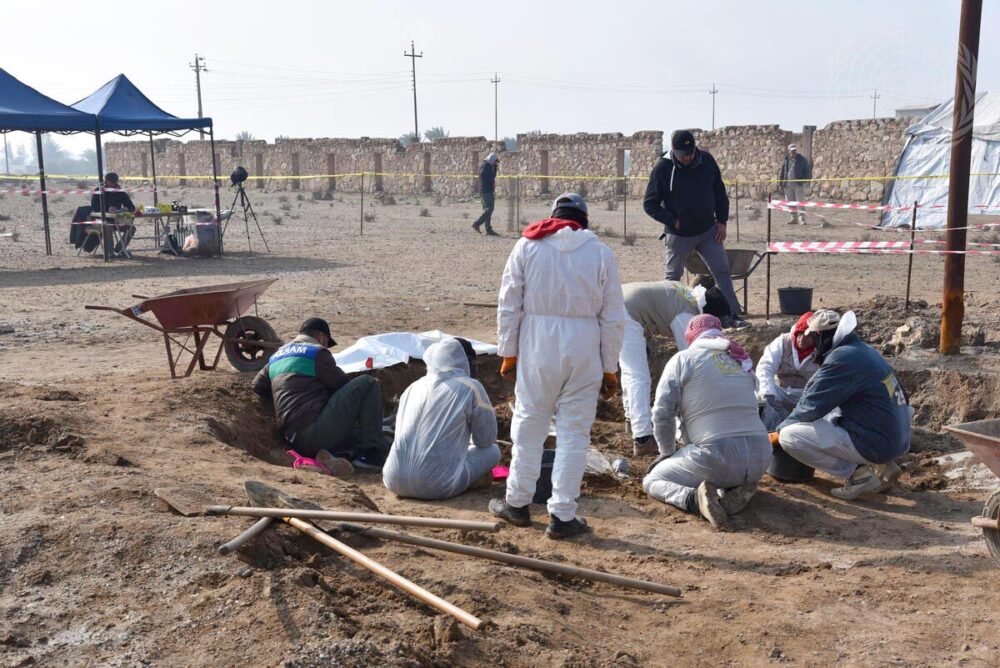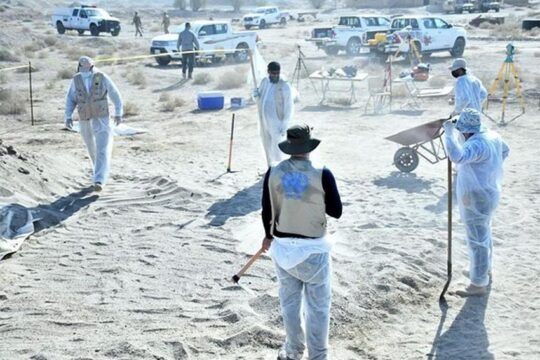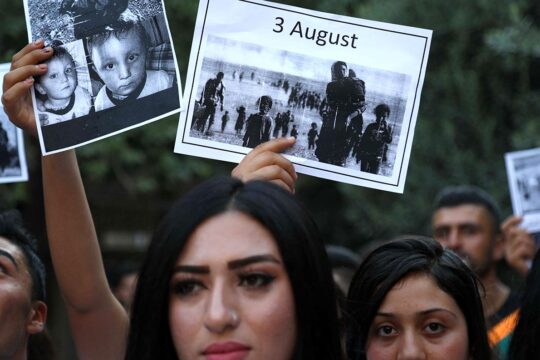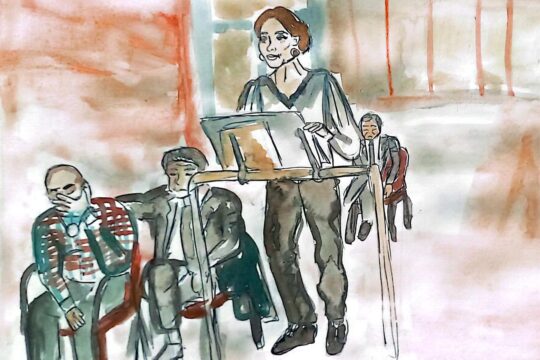In 2017, following a request from Iraq, the UN Security Council (UNSC) passed the Resolution 2379 establishing the Investigative team to promote accountability for crimes committed by Da’esh/ISIL (UNITAD) to support domestic efforts to hold the Islamic State in Iraq and Syria (ISIS) accountable. Headquartered in Baghdad, with guaranteed freedom of movement and unhindered access to places, materials and people considered necessary for the fulfillment of its mandate, UNITAD was a very special team among the UN investigative bodies and had an excellent starting point.
UNITAD operated for seven years with an annual budget of 22 million US dollars. However, its mandate ended prematurely as, in September 2023, Iraq, without consulting the survivors nor the civil society, requested from UNSC to renew UNITAD’s mandate for one year without the possibility of extension. Moreover, UNITAD was asked to hand over all the evidence obtained in Iraq, including witness testimonies, to stop sharing evidence with third states and to disclose to Iraq the nature of any evidence already shared.
Consequently, UNITAD’s mandate officially ended on 17 September 2024 without a single case of international crimes being adjudicated in Iraq nor even underway. With boots on the ground in the state where the crimes took place, non-state affiliated alleged perpetrators, a cooperative host government, significant international backing, a supportive civil society and survivors eager to see justice done and more than willing to cooperate, UNITAD’s untimely end begs for one question: what went wrong and why the mandate did not realize its full potential?
The arrangement on sharing evidence
The core part of UNITAD’s mandate was to collect, preserve and store evidence of ISIS atrocity crimes committed in Iraq, and to ensure their use before national courts and support investigations in third states. In addition, it was supposed to help build capacity of the judiciary and assist in developing and implementing the required legislative framework. UNITAD was asked to share evidence it collected solely for a use in fair and independent criminal proceedings and in accordance with UN policies and best practices, including a ban on sharing evidence with states that apply the death penalty.
The applicability of UN policies to UNITAD’s mandate and, consequently, the modalities for sharing evidence with Iraq, were directly addressed during negotiations between the UN Secretary-General (UNSG) and Iraq, and stipulated in UNITAD’s final terms of reference (ToR) endorsed by Iraq. Therefore, Iraq was very well aware of it and accepted to make the necessary accommodations in order to receive and make use of the evidence UNITAD were to collect. On its part, UNITAD agreed to inform Iraq whenever it shared the evidence it collected with third states. Last but not least, if it was to share evidence obtained from survivors and other witnesses with Iraqi or any other authorities, UNITAD was obligated to seek and obtain their informed consent beforehand.
No international crimes for ISIS perpetrators
More than 10 years since the ISIS conflict in Iraq, six years since the deployment of UNITAD’s operations and four months after their conclusion, no progress has been made in closing the impunity gap for ISIS international crimes in Iraq. Put differently, no ISIS perpetrator has been held accountable in Iraq for the atrocity crimes committed. During the same period, however, up to 70,000 people have been sentenced for being a member of a terrorist organization under Iraq’s anti-terrorism laws, not only without a meaningful involvement of the survivors, but also without fair trial guarantees.
Despite the occasional pledges, Iraq thus far neither enacted legislation incorporating war crimes, crimes against humanity and genocide into its legal system, nor designated a criminal accountability mechanism with jurisdiction over international crimes. The Initiative led by the Coalition for just reparations – an alliance of Iraqi NGOs supporting survivors’ right to justice and reparations, and incorporating survivor friendly features into the upcoming accountability mechanism – was largely ignored.
Moreover, an initiative of the Kurdistan Regional Government (KRG) to enact such legislation on the regional level was blocked by the Iraqi federal Supreme Court. Recently, Iraqi courts in their rulings against ISIS militants under the anti-terrorism legislation have started to refer to the Yazidi survivors’ law and its qualification of crimes against Yazidis and other minorities as genocide and crimes against humanity. It goes without saying that the mere reference to a statutory genocide recognition is a poor substitute for proper qualification of such acts in national criminal proceedings.
No admissible evidence transferred?
Part of Iraq’s grievances was that instead of handing over admissible evidence such as witness statements and physical evidence, UNITAD only passed on reports and summaries without any probative value.
It appears that UNITAD transferred a part of its evidentiary holdings to Iraq, but mostly digitized versions of records it had received from Iraqi authorities in the first place, as well as information received from witnesses, third states and civil society organizations, when consent was provided. As part of its post-UNITAD strategy, the Iraqi government has established the National Center, a distinct body consisting of holders of judicial functions, with an aim to hold and put to use all evidence of ISIS crimes, including those obtained from UNITAD. It remains unclear, however, what kind of national legal framework will be applied – anti-terrorism law, Iraqi penal code or yet to be enacted law on international crimes – in future proceedings to hold ISIS perpetrators criminally accountable.
Leading up to the end of UNITAD’s mandate, the UNSG issued a report where it called for the upgrading of the UN archiving system to allow the active management of all ISIS-related body of evidence, consisting of some 52 terabytes of digitized documentation. Such an upgrade, done in accordance with international criminal law standards, would allow responses to inquiries from competent state authorities worldwide, including Iraq. Regrettably and in spite of the advocacy of the Iraqi civil society, UNSG´s call was not heeded. Consequently, UNITAD´s evidentiary holdings cannot currently be used to support accountability processes globally. Reasons for failing to establish an enhanced archiving system remain unclear, but may have to do with the current priorities of the UNSC members.
The limits of UNITAD’s mandate
Iraq’s obligation to incorporate international crimes into its legal system was not directly stipulated in UNITAD’s core documents, but it was clearly implied as a logical precondition for pursuing criminal accountability based on the international crimes framework. UNITAD was only mandated to assist Iraq in doing so. More specifically, ToR stipulates in its paragraph 41 that UNITAD, in cooperation with other UN bodies and programs, shall “assist the Government of Iraq in developing and implementing relevant legislation, including on war crimes, crimes against humanity and genocide”.
Iraq’s continuous stalling to hold up to its end of the bargain, to pass necessary legislation aligned with UN policies and best practices, and to ensure observance of fair trial standards, cannot be attributed to UNITAD. Being invited to support national efforts to hold ISIS accountable with full respect of Iraq’s sovereignty, UNITAD had neither the mandate nor the means to pressure Iraq into legislating: its only responsibility was to offer technical assistance and expertise. Though the probative value and quality of the evidence collected cannot be assessed, since they are kept confidential, 16 out of the 20 analytical reports and case assessments handed over to Iraq by UNITAD included underlaying evidence.
Valid objections to UNITAD’s work may include failure to regularly inform Iraq on sharing evidence with third states as stipulated in the ToR, and, perhaps, not involving its Iraqi counterparts more strongly in its operations. One could also speculate about performance, possible underachievement or lack of focus of UNITAD’s leadership.
This being said, UNITAD did break new ground in Iraq by introducing trauma-informed and victim-centered approaches to documentation and investigations, dialoguing with the civil society, excavating mass graves, pursuing multiple lines of investigations towards all affected communities, responding to numerous requests for assistance from third states which at least in 15 cases led to convictions, etc. A major flaw, which cannot be attributed directly to UNITAD, is failure to “activate” the assembled body of evidence as part of the official UN archives after the end of its mandate.
An end to international presence in Iraq
Finally, to answer the question of why UNITAD’s mandate came to such an abrupt and premature end, it seems necessary to go beyond its actual performance and consider the broader picture. Namely, in addition to UNITAD, Iraq also managed to terminate the presence of the UN Assistance Mission for Iraq (UNAMI) by the end of 2025, a body active in Iraq since 2003. Moreover, it reached an agreement with the US to end the military mission of the global coalition to defeat ISIS in Iraq by September 2025. Therefore, it appears that the closure of UNITAD is only a piece of the puzzle, a larger diplomatic initiative aimed at ending or decreasing international presence and thus, from Bagdad’s perspective at least, re-claiming the Iraqi sovereignty, in which case, UNITAD’s performance did not really matter at all.
The most important task for the UN is to establish an enhanced archiving system as part of UN archives in order to make the evidence “active” and support ongoing and upcoming investigations in third states and in Iraq.
Iraqi authorities should use the newly established National Center to consult survivors and the civil society with a view of making good on their promise to deliver justice. This would require not only enacting national legislation on international crimes, but also creating a criminal accountability mechanism. Part of this work should be setting up an adequate witness protection and support program with relevant safeguards in place to enable survivor-centered, efficient and secure proceedings.

Dr. Bojan Gavrilovic, an international human rights lawyer based in Berlin, is a Head of Program for Rights and Justice at the Jiyan Foundation for Human Rights where he focusses on reparations and justice for survivors of atrocity crimes in Iraq. He holds a doctoral degree from the University of Hamburg and has more than 20 years of experience in the Balkans, MENA region and Germany working on torture prevention, monitoring places of detention and transitional justice. Before joining the Jiyan Foundation, he was working at the Belgrade Centre for Human Rights.







